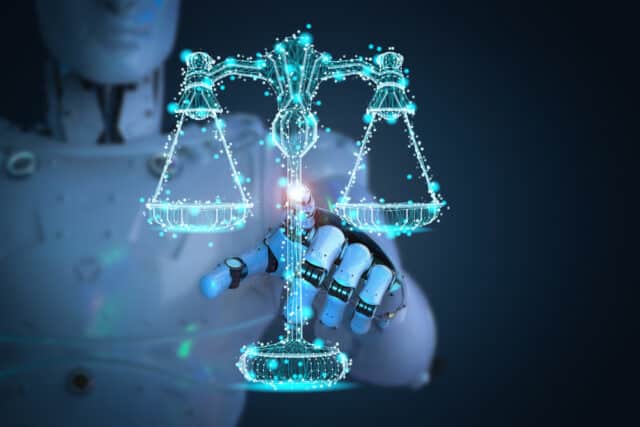Generative AI in the legal sector [Q&A]

The use of generative AI isn't just confined to the tech sector, it's appearing in lots of other industries too in order to streamline operations and boost digital transformation efforts.
We spoke to Jay Madheswaran, CEO of Eve, to learn more about how GenAI is being used by legal firms and the challenges that adopting it can present.
BN: How are AI technologies being integrated into law firms today?
JM: AI has become integral to the operation of modern law firms, even as concerns grow around hallucination risks. There are many applications of AI, some of it less recent than others. For example, machine learning (ML) is commonly embedded in platforms like Westlaw for legal research, enhancing the speed and accuracy of case law and precedent searches.
But it's generative AI that is emerging as a transformative force, enabling automation and augmentation of various legal processes beyond research.
Already, many law firms are starting to deploy generative AI in some way across multiple functions, from contract analysis and due diligence to case strategy and client communications. This is because generative AI tools are particularly adept at drafting routine legal documents, analyzing case facts to identify causes of action, and even assisting in the initial phases of client intake and legal research. This integration not only improves efficiency but also allows legal professionals to focus more on strategic tasks and client engagement rather than mundane administrative duties.
BN: What advantages does generative AI offer to law firms?
JM: The benefits extend far beyond operational efficiency, cost savings, and client service enhancements. AI-driven automation significantly accelerates workflow processes that traditionally require extensive time and human resources. Tasks that previously took junior associates hours or days to complete -- such as document review, letter drafting, contract analysis, and legal research -- are now executed in a fraction of the time, often with higher accuracy.
Generative AI systems can be tailored to specific law firm workflows and preferences, which is quite impactful. By personalizing generative AI at any given firm, legal professionals not only achieve substantial time and cost savings but also enhance the quality and consistency of their legal services. This approach allows law firms to handle larger caseloads efficiently, expedite turnaround times on legal motions and objections, and improve overall client satisfaction.
Law firms are quickly realizing ROI from using generative AI, and are increasingly expanding its application across all facets of their operations. We’re even starting to hear the term 'AI-Native Law Firm' from some of our customers, most notably Frontier Law Center. These firms are integrating generative AI not only in legal research and document generation but also in strategic decision-making processes.
BN: How does generative AI contribute to cost savings and operational efficiency in law firms?
JM: By automating routine tasks and augmenting decision-making processes, generative AI allows legal professionals to focus more on high-value activities that directly impact client outcomes. This shift from manual to automated processes not only reduces overhead costs but also enhances the utilization of billable hours, thereby improving profitability.
And the cost savings can be quite substantial, often ranging from 80 percent to 90 percent in tasks traditionally performed manually. These gains enable firms to reallocate resources previously dedicated to administrative tasks to strategic initiatives such as marketing, business development, and client relationship management. Also, generative AI facilitates faster case resolution and better management of legal complexities, leading to improved client retention and satisfaction rates.
In short, empowering legal professionals to use generative AI systems to execute repetitive tasks, rather than tackle those themselves, firms can achieve a higher realization rate of billable hours and optimize overall operational performance. This operational agility not only supports sustainable growth but also positions AI-native law firms as leaders in adopting innovative technologies to drive efficiency and client-centric service delivery.
BN: What challenges do law firms face in adopting generative AI technologies?
JM: One major challenge is the concern over 'hallucinations', where AI systems generate inaccurate or misleading information. Data security and privacy compliance also pose significant barriers, particularly in handling sensitive client information and maintaining confidentiality. Addressing this issue is crucial to maintaining trust and reliability in AI-assisted legal services
Another challenge is the learning curve associated with generative AI adoption requires ongoing training and development programs for staff. Achieving proficiency in AI technologies calls for a cultural shift within the organization, promoting collaboration between legal professionals and technology specialists to maximize AI's potential in enhancing legal service delivery.
Given these obstacles, it's crucial to partner with the right provider who is constantly working to overcome these obstacles and ensure the effective and ethical use of AI in the legal field.
BN: How can generative AI help transform the business model of law firms?
JM: Generative AI has the potential to transform the business model of law firms by enhancing service delivery, expanding practice areas, and optimizing client engagement strategies. AI-native law firms leverage technology to streamline complex legal processes, thereby improving operational efficiency and client outcomes.
One transformative aspect of generative AI adoption is its ability to support law firms in expanding into lucrative practice areas, especially in contingency litigation. By automating upfront case evaluation and vetting processes, generative AI enables firms to take on more complex and time-consuming cases with greater confidence in their success. This strategic expansion into new practice areas not only diversifies revenue streams but also enhances profitability and competitive positioning in the market.
Generative AI can also facilitate personalized client interactions and communication strategies, allowing law firms to deliver tailored legal services that meet individual client needs and preferences. By integrating AI-driven insights into client relationship management and business development, firms can strengthen client loyalty, improve retention rates, and attract new business opportunities.
Image credit: phonlamai/depositphotos.com
